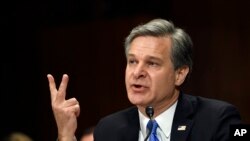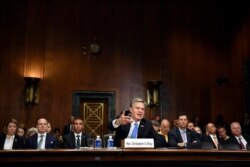Report updated at 7:45 p.m., July 23, 2019.
The FBI has more than 1,000 active investigations into attempted theft of U.S. intellectual property, with nearly all involving China, FBI Director Christopher Wray said Tuesday, underscoring a previous designation of China as the No. 1 counterintelligence threat to the United States.
"I would say that there is no country that poses a more severe counterintelligence threat to this country right now than China," Wray told members of the U.S. Senate Judiciary Committee.
Wray, who has warned about the Chinese threat in similarly stark terms during past congressional testimony, described it as "deep and diverse and wide and vexing" in terms of Beijing's use of operatives, techniques and targets. The warning comes as the Trump administration is waging a trade war with China in part over complaints China engages in rampant intellectual property theft both in the United States and abroad.
"And so, we're working extremely hard with all of our partners to combat it," he said. "But make no mistake, this is a high priority for all of us."
U.S. businesses targeted by China run the gamut both in size and industry type, ranging from small high-tech startups to agriculture companies, Wray said.
Last year, two Chinese rice researchers were charged in a conspiracy to steal highly proprietary rice seeds developed by Colorado-based Ventria Bioscience.
U.S. intelligence officials have long sounded the alarm about China's stepped-up espionage activities as part of an effort to solidify its global economic dominance. In its latest worldwide threat assessment, the U.S. intelligence community said in January that China "remains the most active strategic competitor responsible for cyber espionage against the U.S. government, corporations, and allies."
Increasingly, China uses what the FBI calls "nontraditional collectors" such as businessmen, scientists, academics and graduate students to gather intelligence, Wray said. With the Communist Party of China spreading its tentacles throughout Chinese society, the traditional lines between public and private sector actors have been blurred, if not eliminated, complicating counterespionage efforts.
"The difference between the Chinese government and the Chinese Communist Party, not really a difference," the FBI director said. "The difference between the Chinese government and its private sector is not really a difference."
To combat Chinese espionage, the Justice Department unveiled an initiative last November that would "identify priority Chinese trade theft cases" and ensure they're investigated and prosecuted.
The China initiative is led by John Demers, who leads the Justice Department's national security division. In recent months, the department has announced a number of indictments of Chinese nationals as part of the effort.
Wray, as well as several committee members, expressed concern that U.S. universities remain vulnerable to Chinese economic espionage. The Chinese have "created pipelines" at U.S. universities that allow them to steal and funnel to China key intellectual property "for the advancement of its various strategic plans."
"The irony is that the U.S. is essentially funding that economic resurgence through grants," Wray said.
Sen. John Kennedy, a Republican from Louisiana, said universities aren't doing enough to protect their sensitive research against Chinese sleuthing.
"If we're relying on a university to do it, my guess is a lot of them don't know how, and frankly, some of them probably don't care, as long as they're getting the tuition," Kennedy said.
Wray said that he and other FBI officials have met with various universities and research labs around the country to help them "understand the nature of the threat (and) what to be on the lookout for."







